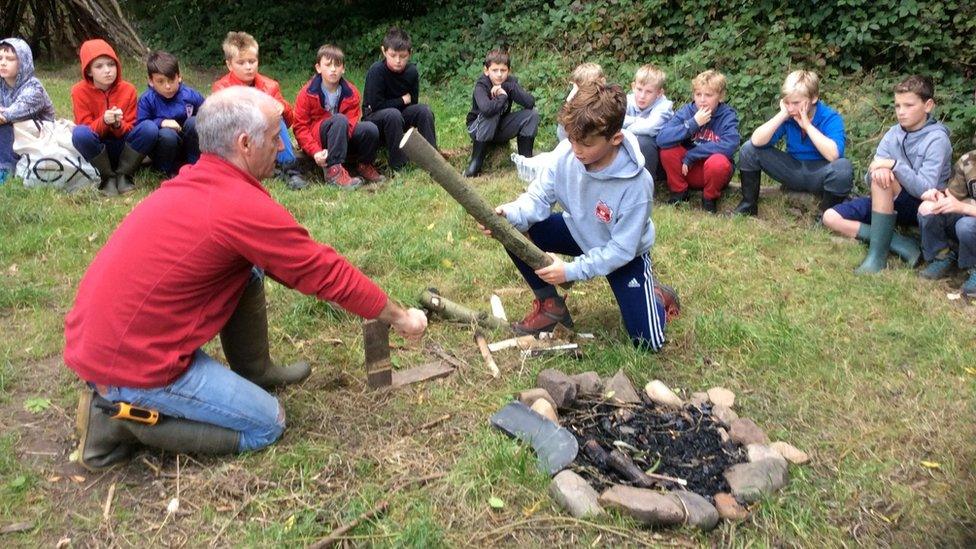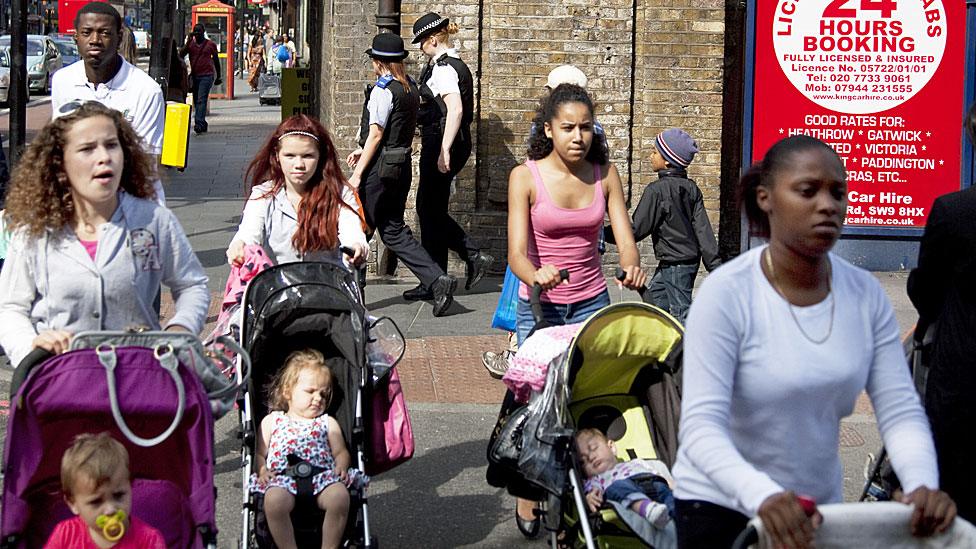Seven unlikely jobs heads do besides running schools
- Published

Head teacher Jim Nicholson teaches woodland skills to pupils
They're the most senior person on the staff and usually the best paid but head teachers increasingly find themselves doing tasks you wouldn't necessarily associate with the role - from catering manager, to odd-job person, to emergency social worker.
To an extent, heads have always taken on extra tasks to save money or helped out in a crisis, according to Jim Nicholson, head of Mellor Primary School, in Stockport.
One basic example would be helping clear up sick if a child has vomited, he says.
"We've all rolled our sleeves up... because it's just part and parcel of mucking in with our colleagues and doing what needs to be done in the immediate situation."
But he says he is being taken away from the day job ever more frequently, blaming a squeezed budget and the increasing needs of children and families in austerity Britain.
Flooring contractor
For Mr Nicholson, one memorable extra-curricular job was laying the concrete floor of the new school bike shed.
The school found its budget for a building project was short of the full amount needed and having a concrete floor was a condition of the project.

So, Mr Nicholson and the school caretaker laid their hands on some bags of ready-mix and took matters into their own hands.
"With my caretaker and a couple of volunteers, we filled the area with concrete as the base.
"We had to do it because there wasn't enough money to do the job," he says.
Their handiwork saved the school £1,000, he remembers - and he's still proud of it.
Catering entrepreneur
Emily Proffitt, head of Tittensor First School, in Staffordshire, says she and her school cook were unhappy with the service from the company supplying the school.
Being asked to cut portion size was the last straw, so, after much research, instead of paying £7,000 a year to an external company, they took "the very bold decision and risk" to bring catering in-house.
"We plan a menu, we do all the allergen testing, we do all the nutritional standards."
The food is now sourced from local butchers and grocers or grown on site.
"The children are getting better quality meals, they're getting more food on their plates, they're eating more food and they're understanding healthy food.
"And instead of paying out money, we are now actually more of a business and we're looking to make money and try and top our budgets up," says Ms Proffitt.

Emily Proffitt's role includes running the school kitchen
Tiler
Ms Proffitt believes doing odd jobs round the school "is protecting the children".
"Because if I start taking money out of the school budget and spending out on those capital jobs that need doing, it means we haven't got the money there for other things that are vital for the children."
Recently, these tasks have included assembling flat-pack furniture and refitting the staff room.
"I've done the tiling round the sink and, with my dad, we've replaced the cupboard doors and refitted the sink and the worktop... projects that would cost thousands of pounds if we got tradesmen in."
"Me becoming an odd-job man means that we have money there to support mental health, to support children that need one-to-one support... and just keep our heads above water really."

Family therapist
Increasingly, families are relying on their children's school for advice and support, says Ms Proffitt.
"There is nobody else available to talk to," she says. "We are the centre and the hub of the community now."
She has been asked to step in as mediator when family relationships break down and to advise on how to access services in a crisis.
"We're not trained to do it... but there are less and less services available for people, so it makes it hard."
She says the local authority family link worker who advised on safeguarding concerns has been made redundant, so she finds herself having to "step into the role without back-up".
And she says other heads she is in contact with as regional representative of the National Association of Head Teachers have similar tales to tell.
"We are all things to all people and that includes being the voice to listen to, the person on the end of the phone, the emails, they come at all hours of the day, all hours of the night and we are there for our communities 24-7 now."
Housing manager
Patrick Foley, head of Southborough Primary, in the outer London borough of Bromley, has a food bank in his school these days.
The area still has its share of affluent people, he says, but "there are more pockets of deprivation in Bromley now than there have been in the past and far more children experiencing poverty and the impact is very obvious".
"We're dealing with a lot more child protection issues, a lot more housing issues, homeless children."
"It used to be exceptional to have a child who was homeless, now its commonplace.
"We have five or six families in our school who are homeless and [it is] very common to be writing letters to local authority housing officers to ask for them to be housed."
"It's becoming a core part of what we do as head teachers."

Social worker
Problems for the poorest families problems pile up, says Mr Foley.
"They are likely to be very vulnerable families with children that have additional needs, they're living in poverty, they're living in fuel poverty, they're in private rented accommodation which is problematic and can be very difficult, they may be subject to domestic violence."
He says cuts to local authority budgets mean schools are increasingly having to step in.
The welfare of families has always been the concern of heads, he says, but they are no substitute for fully trained social workers.
"We're not trained for that - so the problem becomes that children become less safe," he says.
Play worker
Emily Proffitt says the extra tasks mean paperwork is pushed to the evenings and weekends.
"It takes you away from your day job, your nuts and bolts of what it means to be running a school," says Jim Nicholson.

If, for example, there's a child with special educational needs or mental health issues "in meltdown in the foyer, you need somebody who can go to them and deal with it," says Mr Foley.
"I can't do my other stuff, I can't do my paperwork or observe a lesson or meet with the local authority or analyse data.
"And that could be a commitment of hours and hours and hours of time sitting with a child.
"I've spent five hours in a day sitting playing Lego with a child because there was nobody else who could do that, which was great fun but really it's not my job to do that you know.
"I'm quite an expensive play leader."
In a statement the government said that since 2017 schools had received more money for every pupil aged five to 16, adding that Education Secretary Damian Hinds would push for better school funding in the upcoming spending review.
"However, we recognise the budgeting challenges schools face and have introduced a wide range of practical support to help schools and head teachers make the most of every pound on non-staff costs," the statement said.
It continued: "We know some families need more help. That is why we are making sure that more than a million of the most disadvantaged children have free school meals throughout their education, saving families around £400 per year."
- Published30 April 2019

- Published14 April 2019

- Published18 April 2019

- Published15 March 2019

- Published8 March 2019

- Published19 October 2018

- Published19 April 2018
